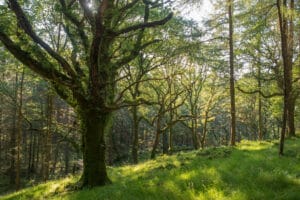CONFERENCE POSTPONED
Coronavirus update on behalf of Dr James Szymankiewicz, Chair of the Devon LNP:
Because of the ongoing coronavirus outbreak and the rapidly changing picture nationally, regrettably we have decided to postpone the Devon Nature and Climate Conference being held on 20th March.
Although current government advice is that events such as ours do not have to be cancelled to reduce the spread of coronavirus, there is growing concern from delegates and speakers about this event going ahead.
Given the logistical implications of this (we have 220 delegates and are running 16 workshops), and the need to provide certainty for all attending, it seems sensible to postpone.
We apologise for any inconvenience this may cause, and plan to move the conference to a new date with the same speakers and delegates. We will confirm details once the situation regarding coronavirus becomes clearer. At this stage we will not be offering refunds, but do please contact us if this is an issue for you.
The Devon Nature and Climate Conference 2020 – Naturally Resilient
20th March at Exeter Racecourse – all day
Huge thanks to all of our Sponsors
Main Sponsors:

Other Sponsors:
We are currently at full capacity – If you would like to be added to the ‘reserve’ list please email Katy Ross and we may be able to offer you a place if delegates drop out.
Chair: Dr James Szymankiewicz, Chair of the Devon LNP, North Devon GP and Director at the Centre for Sustainable Healthcare
Agenda (subject to change)
9.00 Registration opens (coffee and opportunity to look at displays)
9.30 Welcome and update on the Devon LNP – Dr James Szymankiewicz, LNP Chair, North Devon GP and Director of Strategy and Partnership at the Centre for Sustainable Healthcare
9.40 Addressing the ecological emergency: why we need to act and what we need to do – Professor Fiona Mathews, Professor of Environmental Biology, Sussex University and Chair of the Mammal Society
10.05 Devon Climate Emergency – Phil Norrey, CEO Devon County Council and Chair of the Devon Climate Emergency Resilience Group
10.15 Critical links between the ecological and climate emergencies – Kevin Cox, Chair, RSPB
10.25 Questions
10.40 Coffee
11.10 Climate impacts on the marine environment – Dr Matt Frost, LNP Board Member & Deputy Director, The Marine Biological Association
11.20 The national policy context – Professor Michael Winter, NE Board Member & Professor of Land Economy and Society at Exeter University
11.30 The Devon Nature Recovery Network – Harry Barton, Vice Chair LNP & CEO, DWT
11.40 A Devon farmer’s perspective – Mary Quicke, Managing Director, Quicke’s
11.50 Choice of workshops – see below
12.50 Lunch – opportunity to look at displays
13.50 A Forest for Devon – Ross Kennerley, LNP Board Member & Regional Director, Woodland Trust
14.00 The Devon Youth Parliament (TBC)
14.10 Choice of workshops – see below
15.10 Tea
15.30 Natural Capital through the lens of the Local Enterprise Partnership – Melanie Squires, Local Enterprise Partnership Board Member and NFU Regional Director
15.40 5 minute snippets – Net gain, Invasives and Connecting Actively with Nature
16.00 Open Forum – questions to Panel (speakers)
16.20 Closing remarks – Dr James Szymankiewicz, LNP Chair
Workshop Choices
Choice of two of the following workshops – all will involve a mix of presentations and discussion (if some are very popular we may run them twice)
- Protecting and enhancing Devon’s blue carbon assets – Dr Matt Frost, MBA & Dr Steve Guilbert, Devon Maritime Forum – The workshop aims to develop the conversation around blue carbon assets such as saltmarsh and seagrass (extent, threats, opportunities etc) and the role they should play in the Devon Carbon Plan.
- Community action for wildlife – Pam Barrett & John Walters, Buckfastleigh Be Wild Group An opportunity to find out (from an inspirational community champion and one of the best naturalists in Devon) how the Buckfastleigh community is taking action for wildlife (including road verges, deptford pink, Greater Horseshoe Bats…) and working with other parishes to inspire them to do the same.
- From why to how: Expanding Devon’s woodlands with the right tree in the right place – Heather Elgar, Woodland Trust and Kate Tobin, Forestry Commission – There is a welcome surge of interest in tree planting in response to the climate emergency. As such we need to consider critical issues such as choosing the right species and the right places to plant, understanding markets, regulations and incentives, the role of natural regeneration, the impact of pests and diseases and protection of existing wildlife habitats…
- Our future in Peat’s hands? – Morag Angus, SWW & David Leach, DNPA – The workshop will look at why peatland in the SW is so important, extent and condition, potential for carbon capture and nature’s recovery, challenges, opportunities, work done to date and future potential…
- The Future for Devon’s rivers? – Lyn Jenkins, Mary-Rose Lane & Julian Payne, EA – A historic and geomorphological perspective reveals that many of our river systems are in or heading towards a chronic condition that will struggle to support ecosystems. Climate change will only increase these pressures. This workshop will look at these issues drawing on knowledge from the Axe, Torridge and Tamar and discuss how the pressures can be addressed through a long term partnership approach.
- Responding to the landscape implications of climate change – Mel Croll, DCC – This workshop will explore how Devon’s landscape could change over the next 30 years through climate change and our response to the climate and ecological emergencies. Key issues, possible conflicts and action needed will be discussed.
- Soils, carbon and nature – Hazel Kendall, West Country Rivers Trust & Becky Wilson, Rural Business School, Duchy – Soils are a key resource that can be used for climate change mitigation as well as building resilient farming systems fit for the future. Measuring soil carbon levels on-farm in a way that is practical, robust and cost effective has been the significant challenge. Hear about projects that are pioneering this research on farms in the south west and the opportunities that this brings in terms of carbon payments and offsets.
- Should we be planting eucalyptus hedges? – Rob Wolton & Matthew Axe, Devon Hedge Group – How can hedges help us to meet carbon targets? how can they help us and wildlife adapt to a more extreme climate? do we need more, wider, taller, eucalyptus hedges? should we abandon traditional management techniques in response to the climate crisis?
- Tackling the health and ecological crisis – the co-benefits of a Naturally Healthy approach – Dr James Szymankiewicz, GP & Tom Mack, Active Devon – How we are working with evolving programs of social prescribing in Devon to reconnect our communities with nature and achieve a win-win for people, climate and nature.
- Future farm incomes and the role of natural capital – Professor Michael Winter, Paul Cottington, NFU & Gary Mantle, FWAG SW – New Agriculture and Environment Bills are going through parliament and new trade deals are being formed as a result of Brexit. In the light of these new opportunities what is the role of natural capital in supporting farm viability and what could this mean for the future of Devon farms and environmental resilience?
- Bringing Devon’s rare species Back from the Brink –Hannah Gibbons & Mike Waller, Back from the Brink – An overview of what’s happening in Devon to conserve our arable plants, lesser butterfly orchid, grey long-eared bat and narrow-headed ant (focusing on plants). How can we ensure a lasting legacy from these and other short-term funded projects? How do we work in partnership to maintain farmer and volunteer momentum in the long-term when funding ends?
- The River Otter beavers – Peter Burgess & Mark Elliot, Devon Wildlife Trust – The results and findings of the River Otter Beaver Trial.
- The value of Dark Skies for climate, nature and people –Professor Fiona Mathews – Dark skies that were the night time backdrop for the vast majority of human history are for many of us now a rare sight. Excess light spill impacts on wildlife and increases our carbon emissions. Find out how lighting impacts on our wildlife and what we can all do to reduce these impacts.



